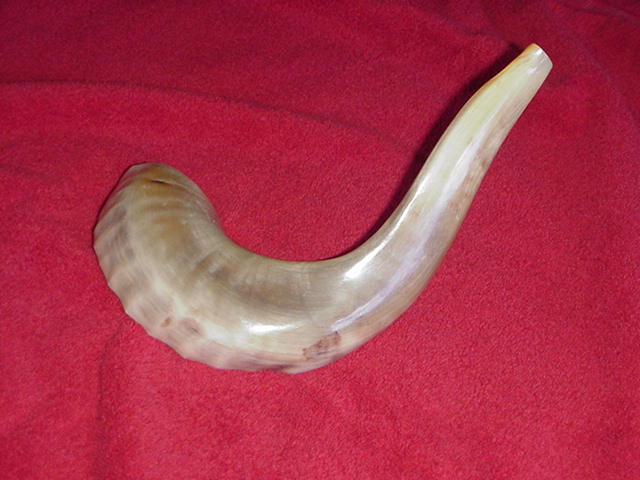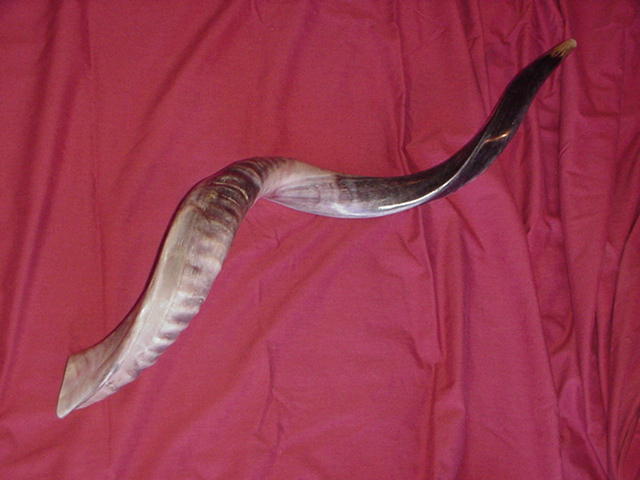
Pick on the Shophar to hear it play
The Shophar
by: Bill Bratt
Email: info@icogsfg.org
The Shophar is made in a 4 step Process:
Heat and Pressure is applied to make it more attractive.
The Grinding Wheel is used to grind and remove the rough exterior and reveal a beautiful texture and coloration.
A Drill is used to open a path so air can flow through the horn.
The last step is Polishing which turns it into a beautiful art object. The Polishing smooths out the roughness left by the grinding process and brings a high glossy shine to the shophar.
We can apply some SPIRITUAL qualities to this process:
God uses Heat and Pressure in our lives to help us grow. He does this through situations, trials and tests.
The Grinding process reveals our inter beauty through God's holy spirit.
The Drilled hole allows God's breath to flow through us.
The Polishing represents letting our light shine to bring glory to God.
The Shophar is probably the oldest musical instrument still in use today. The Ram's horn might have been the first instrument played on earth. The father of all those who play the lyre and pipe was Jubal, a name related to the Hebrew word for ram. (Gen. 31:27).
To the Hebrew mind, horns were potent symbols.
Not only did horns symbolize physical power (Deut 33:17) but the holy alters designed by God - both the sacrificial altar and the altar of incense had horns (Exodus 27:1, 30:1). The Lord Himself is the 'horn of our salvation' (2 Sam. 22:3, Psalms 18:2). Each shophar came from an animal suitable for God-ordained sacrifice. In addition, (shophar) horns, carried the divine anointing oil. (1 Sam. 16:1). Relative to most other instruments, an animal horn is divinely made. Horn blowing was a way of involving nature in praise of the Creator. Psalms 150:3 says: "Praise Him with the sound of the trumpet (shophar)."
There Are Five (5) Different Occasions Where the Shophar is Used:
First, it is used at every joyful occasion.
What could be more joyful than a wedding. Part of the answer for continued use of the ram's horn is probably that despite musical limitations, ram's horns were effective NOISE-MAKERS. In Jewish weddings of Jesus' day the shophar was used when the wedding party got close to the brides house, they gave a shout and blew the shophar to let the bride know her bridegroom was coming.
The second occasion that the shophar is used is to confuse the enemies.
Judges 7:1,16-22 states: "Then Jerubbaal (that is, Gideon) and all the people who were with him rose early and encamped beside the well of Harod, so that the camp of the Midianites was on the north side of them by the hill of Moreh in the valley. {16} Then he divided the three hundred men into three companies, and he put a trumpet (shophar) into every man's hand, with empty pitchers, and torches inside the pitchers. {17} And he said to them, "Look at me and do likewise; watch, and when I come to the edge of the camp you shall do as I do: {18} "When I blow the trumpet (shophar), I and all who are with me, then you also blow the trumpets (shophars) on every side of the whole camp, and say, 'The sword of the LORD and of Gideon!' " {19} So Gideon and the hundred men who were with him came to the outpost of the camp at the beginning of the middle watch, just as they had posted the watch; and they blew the trumpets (shophars) and broke the pitchers that were in their hands. {20} Then the three companies blew the trumpets (shophars) and broke the pitchers; they held the torches in their left hands and the trumpets (shophars) in their right hands for blowing; and they cried, "The sword of the LORD and of Gideon!" {21} And every man stood in his place all around the camp; and the whole army ran and cried out and fled. {22} When the three hundred blew the trumpets (shophars), the LORD set every man's sword against his companion throughout the whole camp; and the army fled to Beth Acacia, toward Zererah, as far as the border of Abel Meholah, by Tabbath."
The third occasion that the shophar is used is at the beginning of every month.
Psalms 81:3-4 (NKJV) "Blow the trumpet (shophar) at the time of the New Moon, At the full moon, on our solemn feast day. {4} For this is a statute for Israel, A law of the God of Jacob."
The fourth occasion that the shophar is used is to call a sacred assembly and a solemn fast.
The shophar is blown in the synagogue on certain special occasions: at the New Year (Feast of Trumpets), at the conclusion of the Day of Atonement, and on the seventh day of the Feast of Tabernacles. In the Temple, according to Josephus, calls were sounded on the Sabbath at it's commencement on Friday evening and at it's close. Quote from Josephus in 'The Wars of the Jews': "One of the priests stood... and gave a signal beforehand, with a trumpet (shophar), at the beginning of every seventh day, in the evening twilight, as also at the evening when the day was finished, as giving notice to the people when they were to leave off work, and when they were to go to work again".
Let's look at the same scripture again for this point that the Shophar is used to call a sacred assembly. Psalms 81:3-4 (NKJV) "Blow the trumpet (shophar) at the time of the New Moon, At the full moon, on our solemn feast day. {4} For this is a statute for Israel, A law of the God of Jacob."
The fifth occasion that the shophar is used is for the sound of war!
What was Jeremiah's reaction when he heard the sound of the Ram's horn? Jeremiah 4:19-21 says: "O my soul, my soul! I am pained in my very heart! My heart makes a noise in me; I cannot hold my peace, Because you have heard, O my soul, The sound of the trumpet (shophar), The alarm of war. {20} Destruction upon destruction is cried, For the whole land is plundered. Suddenly my tents are plundered, And my curtains in a moment. {21} How long will I see the standard, And hear the sound of the trumpet (shophar)?"
The shophar, or ram's horn, was used as an alarm of war. It's sound filled those who heard it with fear because they knew it signified that the horror of war was imminent! It is this warning of an imminent crisis that sets apart the Feast of Trumpets from God's other Holy Days. It is this warning of war that gives the joyous Feast of Trumpets it's contrasting note of solemnity.
According to Jewish Tradition, the shophar, was blown on the Feast of Trumpets, in addition to the silver trumpets. The silver trumpets could produce a variety of notes, but the shophar produced only a piercing blast. (See Numbers 10:1-10 for scriptures on the Silver Trumpets.)
The piercing blast of a shophar is often referred to in the Bible as a SHOUT, or noise - it did not have a musical connotation but signified a warning, like a fire alarm or an air raid siren.
The Prophet Isaiah records that "in that day", which means in the last days, the "great trumpet" will be blown: "So it shall be in that day: The great trumpet will be blown; They will come, who are about to perish in the land of Assyria, And they who are outcasts in the land of Egypt, And shall worship the LORD in the holy mount at Jerusalem" (Isa 27:13 NKJV).
Letís notice in the New Testament that a shout and a trumpet is associated with the return of Jesus Christ to this earth: "For the Lord Himself will descend from heaven with a shout, with the voice of an archangel, and with the trumpet of God. And the dead in Christ will rise first" (1 Thess. 4:16 NKJV).
IN CONCLUSION:
In times of national crisis the Shophar's sound filled those who heard it with fear because they knew it signified that war was imminent.
The Prophet Joel said: "Blow the trumpet (shophar) in Zion, And sound an alarm in My holy mountain! Let all the inhabitants of the land tremble; For the day of the LORD is coming, For it is at hand" (Joel 2:1 NKJV).
--------------------------------------------
Source of information: VCR tape "Shophar" by: Jewish Jewels.
